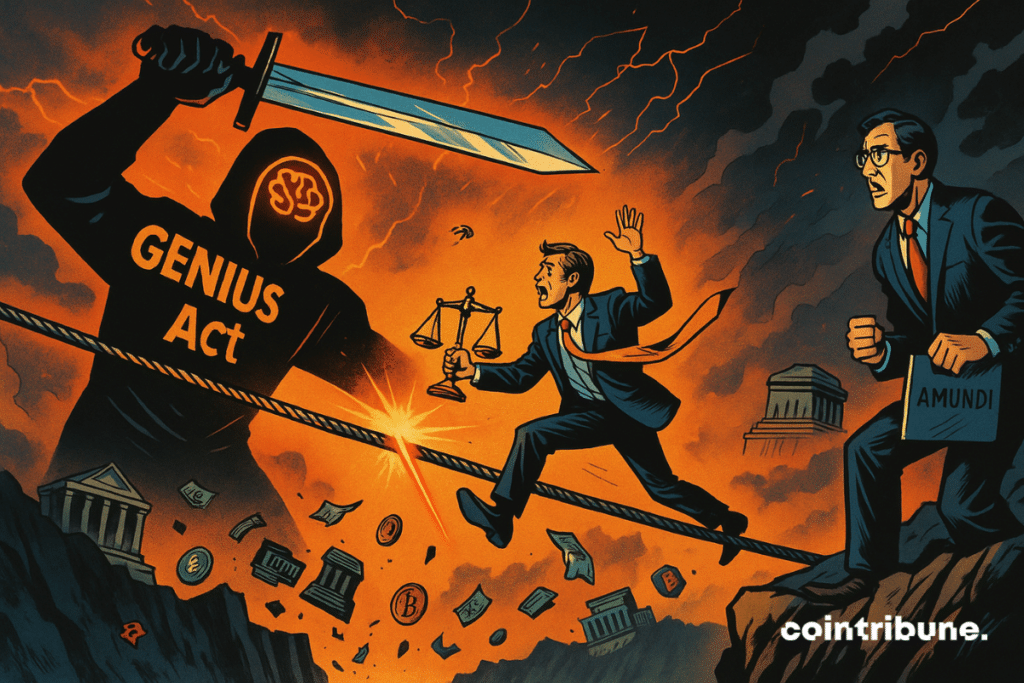Crypto: The GENIUS Act Could Weaken The Global Financial System According To Amundi
As stablecoins gain legitimacy, a US law rekindles the fractures between monetary sovereignty and the supremacy of the dollar. With the GENIUS Act, adopted by the Senate, Washington regulates cryptos backed by the greenback. However, in Europe, the counterattack is organizing. Amundi fears a global destabilization. Behind this legal framework, a monetary offensive with systemic effects is emerging.

In brief
- The GENIUS Act, adopted by the US Senate, aims to regulate dollar-backed stablecoins and could soon come into effect.
- Amundi, Europe’s leading asset manager, warns of the potentially destabilizing consequences of this legislation.
- The GENIUS Act would encourage massive purchases of US Treasury bonds, thereby strengthening global dependence on the dollar.
- A new era of digital monetary warfare could well begin with a law that appears purely technical.
The GENIUS Act: a catalyst for monetary shift?
The adoption of the GENIUS Act in the US Senate marks a turning point for the crypto sector. This legislation aims to establish a legal framework for dollar-backed stablecoins, paving the way for national regulation of these assets.
Indeed, if this new law is also approved by the House of Representatives and then signed by President Trump, it could trigger an unprecedented surge in demand for these cryptos. For Vincent Mortier, Chief Investment Officer at Amundi, the consequences could be significant: “it could be genius, or it could be evil”, he emphasized. Behind this ambivalent phrase, a whole monetary architecture could falter.
Projections on the stablecoin market illustrate how this regulatory change could be a leverage effect. Several key data points measure the scale of the phenomenon:
- Other bolder estimates mention a possible surge up to 2,000 billion dollars;
- 98% of stablecoins currently in circulation are backed by the dollar, reinforcing the centrality of the greenback in the ecosystem;
- Yet, more than 80% of stablecoin transactions take place outside the United States, revealing a largely global usage;
- The GENIUS Act could also stimulate demand for US Treasury bonds, used as collateral, thus indirectly contributing to financing the US deficit.
These concrete on-chain data show that the US law could induce a profound reconfiguration of international capital flows, with a potential shift toward global digital dollarization.
Systemic risks on a global scale
Concerns expressed by Amundi go beyond market mechanisms or technical regulation. They affect the monetary sovereignty of states, particularly outside the United States.
CIO Vincent Mortier fears that these stablecoins, becoming de facto “quasi-banks”, capture deposits from individuals and companies outside traditional circuits. “People will deposit money in a stablecoin assuming they can withdraw it at any time”, he explains.
This quasi-banking function, coupled with the growing use of these assets as means of payment, could disintermediate banking systems and weaken central banks, especially in emerging economies.
This concern is shared by several European financial authorities. Last April, Italy’s Finance Minister, Giancarlo Giorgetti, stated that the US policy on stablecoins constituted “a threat even more dangerous to European financial stability than the trade war led by Trump”.
The Bank for International Settlements (BIS) also highlighted risks of insufficient transparency, capital flight, and loss of control over monetary policies. According to Mortier, this massive adoption could even “be perceived as an implicit message that the dollar is no longer so strong”, suggesting a symbolic erosion of the greenback’s authority as its usage becomes dematerialized through private proxies.
The future of the global monetary system could thus be partly played out on the field of crypto regulation. If the GENIUS Act establishes itself as a major milestone in the American strategy of digital financial domination, European reactions show that a confrontation is looming.
Maximize your Cointribune experience with our "Read to Earn" program! For every article you read, earn points and access exclusive rewards. Sign up now and start earning benefits.
Diplômé de Sciences Po Toulouse et titulaire d'une certification consultant blockchain délivrée par Alyra, j'ai rejoint l'aventure Cointribune en 2019. Convaincu du potentiel de la blockchain pour transformer de nombreux secteurs de l'économie, j'ai pris l'engagement de sensibiliser et d'informer le grand public sur cet écosystème en constante évolution. Mon objectif est de permettre à chacun de mieux comprendre la blockchain et de saisir les opportunités qu'elle offre. Je m'efforce chaque jour de fournir une analyse objective de l'actualité, de décrypter les tendances du marché, de relayer les dernières innovations technologiques et de mettre en perspective les enjeux économiques et sociétaux de cette révolution en marche.
The views, thoughts, and opinions expressed in this article belong solely to the author, and should not be taken as investment advice. Do your own research before taking any investment decisions.